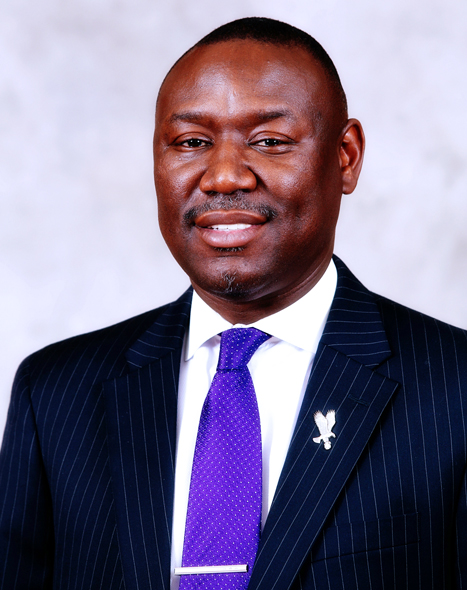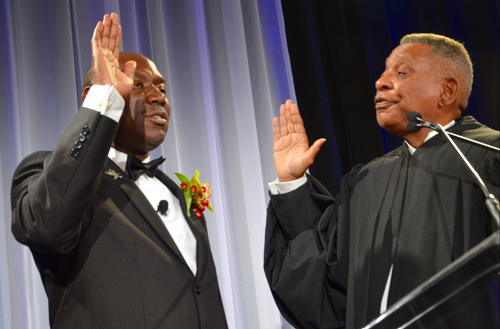Alum Benjamin Crump
 Seeking Justice Through the Profession and His Practice
Seeking Justice Through the Profession and His Practice
To say that Tallahassee attorney Benjamin Crump is busy would be an understatement. When your practice involves high-profile civil rights and personal injury cases all over the country and the national news media contacts you on a regular basis, your schedule is full.
Since his installation as president of the National Bar Association (NBA) on July 23, Crump’s calendar has only become more chaotic. The day he was interviewed for this article, Crump also had interviews scheduled with national media outlets to talk about the results of an NBA survey to be released that same morning. His phone was buzzing relentlessly, but Crump, as usual, made time for his alma mater.
Crump and his law partner Daryl Parks, who founded Parks & Crump shortly after they graduated from the College of Law in 1995, have been involved with the NBA since before they took their attorney’s oaths.
“We went to our first convention even before we became lawyers,” said Crump, who has not missed an annual convention since. “We took the bar exam and Daryl was clerking for Willie Gary, who was a huge advocate for the National Bar Association and he would take his whole firm to the convention every year. We went to Willie Gary and told him we wanted to go to the convention, but we had no money. So, he sponsored us going to our first convention in Baltimore, Maryland in 1995, and we were hooked. We met so many amazing people and great lawyers.
“Much of our success as lawyers and knowing what to do in the realistic sense of law – not the theoretical sense – we learned from the National Bar Association and other lawyers, especially black lawyers, around the country.”
Crump’s installation as the NBA’s 73rd president was held during the organization’s 90th convention in Los Angeles. It marked the 20th consecutive year in which Crump attended the annual meeting.
The theme of Crump’s presidency is, “One NBA united: to preserve our legacy and protect our future.” It is important to Crump that he addresses the issues and opportunities that impact all segments of the NBA membership. During the year, the NBA will host many important events. In September, the organization participated in its annual lobbying effort with the Congressional Black Caucus in Washington, D.C. The NBA held a panel discussion and press conference with two senators who are proposing legislation for a $500 million allocation to purchase body cameras for law enforcement officers across the United States.
“The National Bar Association was the first to endorse this legislation and to partner with these senators to make sure this important initiative became a reality,” said Crump. “Since the tragedies that we’ve seen play out during the past year with police involvement with minorities in cities all over America, we wanted to try to present solutions rather than just continue to talk about the matters that continue to happen over and over again. We think the preventative measure is these body cameras.” As the lead attorney for the family of Michael Brown, Crump believes much of the turmoil in Ferguson, Missouri could have been avoided had there been video footage of what transpired.
In October, the NBA held the annual Wiley Branton Symposium at North Carolina Central Law School to discuss the Voting Rights Act. “The issue I chose is, 50 years after the Voting Rights Act, how far have we come and how much farther do we have to go to the 2016 presidential election to make every vote count.”
In December, the NBA is partnering with the City of Montgomery and the Tuskegee Human and Civil Rights Multicultural Center to commemorate the 60th anniversary of Rosa Parks refusing to give up her seat on a Montgomery bus. The event will focus on the role lawyers played in the civil rights movement.

Honorable Donald L. Graham, of the U.S. District Court for the Southern District of Florida.
Part of what motivates Crump is a desire to improve the reputation of attorneys. “I find myself going around the country giving speeches just as much as, if not more than, I’m in courtrooms these days. That’s important because we, as lawyers, have to show that our profession tries to help present solutions for our society to make it a better place. We have to be ambassadors for the profession. When we try to provide a voice for the voiceless and we try to make sure that everybody is given equal justice under the law, it helps our profession to be viewed as a noble profession. We should all strive to make sure people understand that our calling is a noble one. We have to live up to that oath that we swore to when we first became lawyers.”
While he is not in the courtroom as often as he used to be, in September Crump traveled to Houston for a civil trial that ended in a settlement minutes before jury selection was to begin. The trial was scheduled after a groundbreaking, unanimous U.S. Supreme Court decision in favor of Crump’s client that affects hundreds of cases around America. “It was the first time in almost 20 years that the Supreme Court ruled against a police officer,” said Crump about Tolan v. Cotton.
The Houston case is one of the many instances where people have contacted Crump and urged him to take their cases. It is also one of the cases that Crump has accepted because he sees injustice resulting from the color of a person’s skin.
“As lawyers, we see such arbitrary prosecution on matters,” said Crump, who also represented the families of Trayvon Martin and Martin Lee Anderson. “We’re going around the country trying to do a lot of work to say, ‘The law should be fair to everybody.’ We’re not asking for anything special, we’re just asking that it be fair.”
As printed in the fall 2015 issue of Florida State Law magazine.
